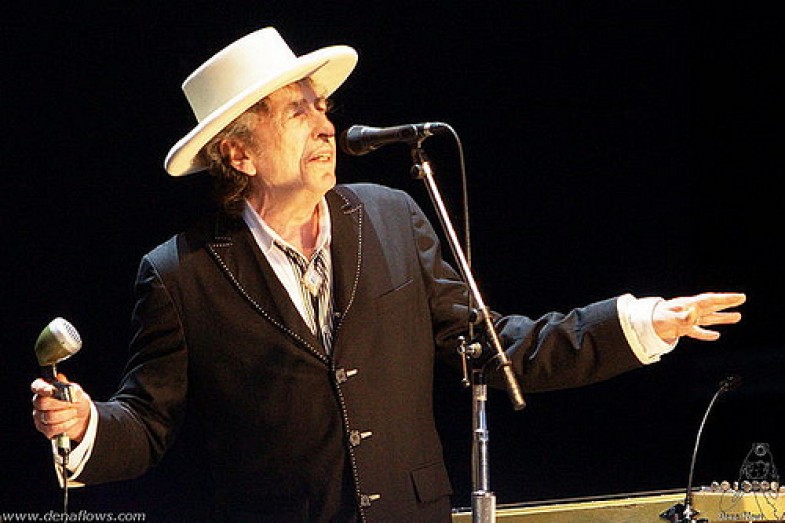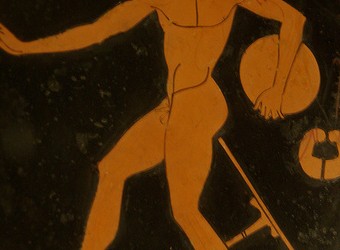Bob Dylan’s autobiography Chronicles offers a good demonstration of the old saw that great artists steal — though in fact, I wish we’d get rid of the theft image here. Let us say instead that great artists are commoners. They enter and live in that vast inheritance, the cultural commons.
Would it be possible to map Dylan’s own debts to that heritage? He himself tells us a lot about where to look.
For example, John Hammond at Columbia Records introduced Dylan to Robert Johnson’s music. When Dylan arrived in New York, Columbia had just bought Johnson’s recorded work from an old label and was about to issue an LP. Hammond gave Dylan an acetate copy.
“When Johnson started singing, he seemed like a guy who could have sprung from the head of Zeus in full armor… . Over the next few weeks I listened to [the record] repeatedly, cut after cut, one song after another, sitting staring at the record player… . The songs were layered with a startling economy of lines… .”
“I copied Johnson’s words down on scraps of paper so I could more closely examine the lyrics and patterns, the construction of his old-style lines and the free association that he used….”
Exactly the same thing had happened in Minneapolis a few years earlier when Dylan first heard Woody Guthrie’s songs. He also describes large debts to Hank Williams, and to the old English ballads as collected by Francis James Child. Dylan had been schooled in these in Minneapolis by an English professor at the University. “I could rattle off all these songs without comment as if all the wise and poetic words were mine and mine alone. The songs had beautiful melodies and were filled with everyday leading players like barbers and servants, mistresses and soldiers, sailors, farmhands and factory girls….”
In this way we come to the first time that Dylan recorded songs for Leeds Music, his first publisher. The day he went to the Leeds offices, he writes, “I didn’t have many songs, but I was making up some compositions on the spot, rearranging verses to old blues ballads, adding an original line here or there, anything that came into my mind—slapping a title on it…. I would make things up on the spot all based on folk music structure….” About the old song, “Sixteen Tons,” he says: “You could write twenty or more songs off that one melody by slightly altering it.”
Perhaps the most striking example Dylan gives of his schooling tells about a time that his girlfriend took him to hear an evening of Bertolt Brecht/Kurt Weill songs. “They were like folk songs in nature, but unlike folk songs, too, because they were so sophisticated…. The song that made the strongest impression was a show-stopping ballad…, ‘Pirate Jenny’….”
“Later, I found myself taking the song apart, trying to find out what made it tick, why it was so effective. I could see that everything in it was apparent and visible but you didn’t notice it too much. Everything was fastened to the wall with a heavy bracket, but you couldn’t see what the sum total of all the parts were, not unless you stood way back and waited ‘til the end. It was like the Picasso painting Guernica….”
In the end, Dylan offers a list of his own early songs —“Mr. Tambourine Man,” “Lonesome Death of Hattie Carroll,” “A Hard Rain’s A-Gonna Fall,” and others —and then says: “If I hadn’t … heard the ballad ‘Pirate Jenny,’ it might not have dawned on me … that songs like these could be written. In about 1964 and ’65, I probably used about five or six of Robert Johnson’s blues song forms, too, unconsciously, but more on the lyrical imagery side of things. If I hadn’t heard the Robert Johnson record when I did, there probably would have been hundreds of lines of mine that would have been shut down — that I wouldn’t have felt free enough or upraised enough to write.”
In the same context Dylan writes of reading Rimbaud’s line, Je est un autre, “which translates into ‘I is someone else.’ When I read those words the bells went off. It made perfect sense. I wished someone would have mentioned that to me earlier.”
This is the Rimbaud-Dylan version of Isaac Newton’s line, “If I have seen farther it is by standing on the shoulders of giants.” Dylan seems to me to be saying, “If I am anything, it is because I have allowed others to inhabit me.”
All great artists who live and work in the cultural commons might take that as their motto: “Je est un autre.”





